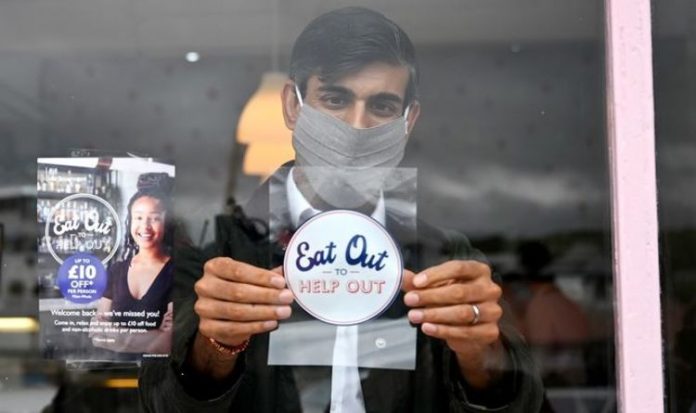A new study has suggested the Chancellor Rishi Sunak’s summer Eat Out to Help Out scheme caused a spate of new coronavirus cases. The scheme, which ran in August, was used to get the British public spending money again following the reopening of pubs and restaurants during the spring lockdown.
Over 64 million sit-in meals were had on the scheme, which gave diners 50 percent off their meal up to the value of £10.
More than 50,000 restaurants opted-in to the scheme, which did help the hospitality sector to recover somewhat following its near-complete closure during lockdown.
Earlier in October, the Prime Minister Boris Johnson admitted the scheme likely contributed to new cases of COVID-19.
He said: “Insofar as that scheme may have helped to spread the virus then obviously we need to counteract that with the discipline and the measures that we’re proposing.”
Dr Thiemo Fetzer said the scheme “contributed to community transmission” and “the acceleration of the second wave”.
He told Sky News: “The UK saw a massive explosion of cases in a way that was not seen in other countries.
“It’s that scheme that has helped to bring about an earlier second lockdown and restrictions on the restaurant sector that it was determined to help economically.”
Toby Phillips, executive director of the Oxford COVID-19 response tracker at the Blavatnik School of Government, said: “The Eat Out to Help Out scheme was part of a general package of policy and communications over the summer that encouraged people to go out and adopt a ‘back to normal’ mindset.
DON’T MISS
Can I go trick or treating on Halloween this year? Latest advice [EXPLAINER]
Will the UK have a second lockdown? [INSIGHT]
Can hairdressers open in Tier 3? [EXPLAINER]
“That creates this whiplash when one month you’re being told ‘get out there, have confidence, go back to business, back to normal’ – and in the next month there’s a new tier scheme being put in place.”
“We should not subsidise people to gather indoors.”
Between August 10 and September 20, Public Health England (PHE) said that – among people who tested positive for COVID-19 – eating out was the most commonly reported activity in the two to seven days prior to the onset of symptoms.
The Treasury has rejected the findings of the research.
A Treasury spokesperson said: “We do not recognise these figures – which as the study itself admits, are ‘back-of-the-envelope’ calculations.
“Many other European counterparts have experienced an uptick in cases – irrespective of whether similar measures for the hospitality industry have been introduced.
“We’re continuing to work closely with businesses to help them be COVID-secure.”







